
China’s real estate crisis began in 2021 and has impacted the local and global economy ever since. At its peak, the Chinese real estate sector once account
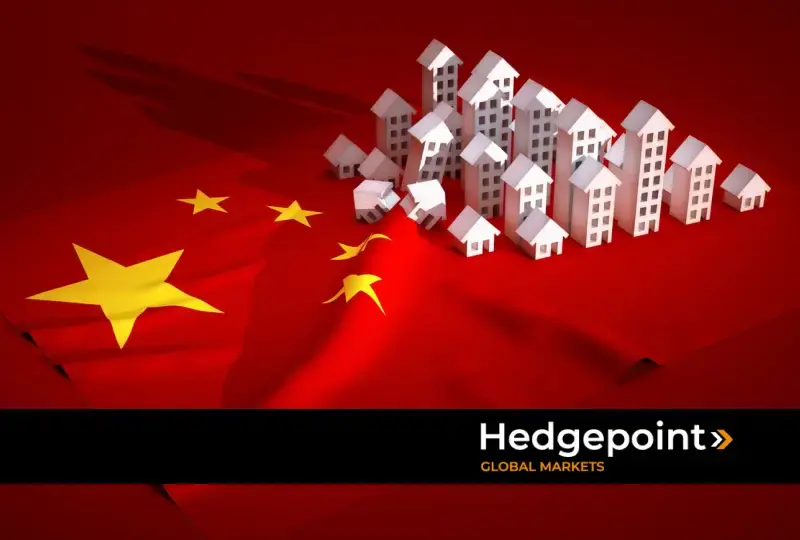
China’s real estate crisis began in 2021 and has impacted the local and global economy ever since. At its peak, the Chinese real estate sector once accounted for around a quarter of the country’s GDP. Today, China’s real estate prices fall periodically, registering in June 2024 the fastest drop in 9 years.
In this article, we’ll understand what caused this collapse, what the current situation is, what the retention measures are and more.
The Chinese real estate crisis began mainly through monetary policies granted to local developers. State-owned banks made low interest rates available to companies to boost housing construction around the country. However, this accelerated expansion resulted in debt for companies that financed large projects, often without enough capital to cover the costs. As fewer buyers acquired new properties, the sector began to face a severe crisis.
Below, you can follow the peak of real estate construction in China in 2021 and the decline in the following years:
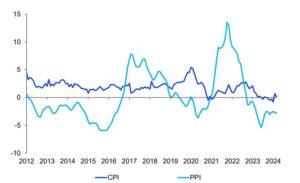
Source: KPMG
To make ends meet, developers have increased property prices, but the result on the market has been the opposite: the high prices have reduced demand within the country. This generated a chain effect that you can follow below:
1 – Restrictive policies for developers
The local government has imposed restrictions on the indebtedness of construction companies, limiting their debts according to the proportion of their assets.
2 – Pressure on companies’ cash flow
Real estate companies faced difficulties in obtaining new financing and refinancing their debts due to restrictive policies.
3 – Oversupply
Large-scale construction and an aging population have resulted in an increase in the supply of real estate in the country. See the latest data on China’s real estate stock:
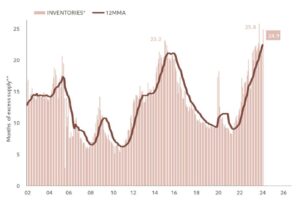
Source: ICIS
4 – Crisis in one of the largest real estate companies
Evergrande collapsed financially due to its indebtedness. This caused a series of problems in the credit market, damaging banks and investors. Other developers, such as Country Garden, also weakened after the start of the crisis.
In August 2023, Evergrande’s shares plummeted 79%. Country Garden reported a loss of US$6.7 billion in the first half of the same year.
5 – Distrust in the real estate sector
Thousands of real estate projects have been halted or delayed in China. This has increased distrust in the sector, as many Chinese have not received their homes.
6 – Falling property values
This scenario shattered the image of real estate as a safe investment for the Chinese. High supply and shrinking demand have led to a rampant reduction in prices.
See below for a graph showing this decline, especially from 2021 onwards:
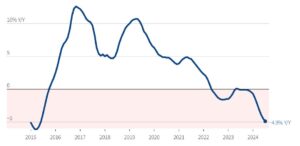
Source: Reuters
Sales in the real estate sector continue to fall. Currently, the reduction is 20.2% compared to last year. In investment, there was also a decline of 9.8% in the first four months of 2024, while new construction starts fell by 24.6%. According to Reuters, new home prices also fell for the 13th consecutive month, with a 0.7% drop.
Data from the Central Bank of China shows how much people expect property prices to fall. In August 2024, 23.2% of Chinese still believed that values would continue to fall in the third quarter of the year, a record since the data became available in 2013. With the crisis of domestic confidence and the belief that prices will continue to fall, there is less incentive for buyers to purchase real estate at the moment. This creates uncertainty about when the crisis will end.
According to Goldman Sachs, the total value of unsold or unfinished homes in China is around 30 trillion yuan, or 4.1 trillion dollars. The institution says that more than 967 billion dollars may be needed to reduce the housing supply to pre-collapse levels.
In terms of millions of square meters built, new residential developments in China fell by 58%, from 1,515 million m² in 2019 to 637 million m² in 2023. See below:
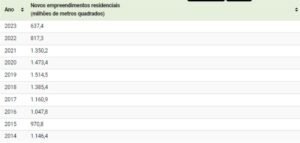
Source: Visual Capitalist
The record housing supply is still affecting liquidity in the real estate sector and the Chinese economy, as the figures show. However, the local government is already working on measures to stabilize the market. The aim is to compensate for declining demand, slow the fall in prices and control the stock of unsold properties.
Among the main solutions announced by the Chinese government is a reduction in mortgage interest rates. The aim is to encourage the use of loans to boost real estate sales. China’s Central Bank has also announced the creation of a 300 billion yuan fund for affordable housing, a measure that seeks to increase demand for middle-class properties.
Finally, state-owned companies have also been looking to buy apartments in order to reduce the supply on the real estate market, in addition to the Country Garden liquidation hearing (which has been postponed until January 20, 2025).
For the future, expectations are still uncertain. There is no forecast for the real estate sector to return to pre-crisis levels. The Chinese government has already accumulated US$15 trillion in debts related to the pandemic and infrastructure. This puts pressure on public accounts and restricts the source of funding that could heat up the market again.
China’s real estate sector accounts for a significant part of the country’s GDP. With a slowdown in this sector, the nation’s growth is also directly impacted.
This reduction in the economy influences global demand, especially for commodities (such as steel, soybeans and more). In the long term, these consequences could harm commodity-exporting countries like Brazil, a major trading partner of the Asian nation.
The economic slowdown in China also affects global supply chains. The country is a major manufacturing center and a drop in economic activity could impact nations that depend on Chinese products. Furthermore, in the event of a drop in Chinese exports and revenue, other nations may have to lower interest rates or adopt expansionary policies to mitigate the negative impacts.
The uncertainty surrounding the Chinese real estate crisis has caused volatility in the commodities market. As this collapse can hit demand for products, the prices of raw materials are also changing across the globe.
In this scenario, hedging is an important tool that contributes to price protection. Contact a specialist at Hedgepoint and find out more about our hedging products that can help you manage commodity price risks.

Rua Funchal, 418, 18º andar - Vila Olímpia São Paulo, SP, Brasil
Contato
(00) 99999-8888 example@mail.com
Section
Home
O que Fazemos
Mercado
Quem Somos
HUB
Blog
Esta página foi preparada pela Hedgepoint Schweiz AG e suas afiliadas (“Hedgepoint”) exclusivamente para fins informativos e instrutivos, sem o objetivo de estabelecer obrigações ou compromissos com terceiros, nem de promover uma oferta ou solicitação de oferta de venda ou compra de quaisquer valores mobiliários, commodity interests ou produtos de investimento.
A Hedgepoint e suas associadas renunciam expressamente a qualquer uso das informações contidas neste documento que direta ou indiretamente resulte em danos ou prejuízos de qualquer natureza. As informações são obtidas de fontes que acreditamos serem confiáveis, mas não garantimos a atualidade ou precisão dessas informações.
O trading de commodity interests, como futuros, opções e swaps, envolve um risco substancial de perda e pode não ser adequado para todos os investidores. Você deve considerar cuidadosamente se esse tipo de negociação é adequado para você, levando em conta sua situação financeira. O desempenho passado não é necessariamente indicativo de resultados futuros. Os clientes devem confiar em seu próprio julgamento independente e/ou consultores antes de realizar qualquer transação.
A Hedgepoint não fornece consultoria jurídica, tributária ou contábil, sendo de sua responsabilidade buscar essas orientações separadamente.
A Hedgepoint Schweiz AG está organizada, constituída e existente sob as leis da Suíça, é afiliada à ARIF, a Associação Romande des Intermédiaires Financiers, que é uma Organização de Autorregulação autorizada pela FINMA. A Hedgepoint Commodities LLC está organizada, constituída e existente sob as leis dos Estados Unidos, sendo autorizada e regulada pela Commodity Futures Trading Commission (CFTC) e é membro da National Futures Association (NFA), atuando como Introducing Broker e Commodity Trading Advisor. A Hedgepoint Global Markets Limited é regulada pela Dubai Financial Services Authority. O conteúdo é direcionado a Clientes Profissionais e não a Clientes de Varejo. A Hedgepoint Global Markets PTE. Ltd está organizada, constituída e existente sob as leis de Singapura, isenta de obter uma licença de serviços financeiros conforme o Segundo Anexo do Securities and Futures (Licensing and Conduct of Business) Act, pela Monetary Authority of Singapore (MAS). A Hedgepoint Global Markets DTVM Ltda. é autorizada e regulada no Brasil pelo Banco Central do Brasil (BCB) e pela Comissão de Valores Mobiliários (CVM). A Hedgepoint Serviços Ltda. está organizada, constituída e existente sob as leis do Brasil. A Hedgepoint Global Markets S.A. está organizada, constituída e existente sob as leis do Uruguai.
Em caso de dúvidas não resolvidas no primeiro contato com o atendimento ao cliente (client.services@hedgepointglobal.com), entre em contato com o canal de ouvidoria interna (ombudsman@hedgepointglobal.com – global ou ouvidoria@hedgepointglobal.com – apenas Brasil) ou ligue para 0800-8788408 (apenas Brasil).
Integridade, ética e transparência são valores que guiam nossa cultura. Para fortalecer ainda mais nossas práticas, a Hedgepoint possui um canal de denúncias para colaboradores e terceiros via e-mail ethicline@hedgepointglobal.com ou pelo formulário Ethic Line – Hedgepoint Global Markets.
Nota de segurança: Todos os contatos com clientes e parceiros são realizados exclusivamente por meio do nosso domínio @hedgepointglobal.com. Não aceite informações, boletos, extratos ou solicitações de outros domínios e preste atenção especial a variações em letras ou grafias, pois podem indicar uma situação fraudulenta.
“Hedgepoint” e o logotipo “Hedgepoint” são marcas de uso exclusivo da Hedgepoint e/ou de suas afiliadas. O uso ou reprodução é proibido, a menos que expressamente autorizado pela HedgePoint.
Além disso, o uso de outras marcas neste documento foi autorizado apenas para fins de identificação. Isso, portanto, não implica quaisquer direitos da HedgePoint sobre essas marcas ou implica endosso, associação ou aprovação pelos proprietários dessas marcas com a Hedgepoint ou suas afiliadas.
aA Hedgepoint Global Markets é correspondente cambial do Ebury Banco de Câmbio, de acordo com a resolução CMN Nº 4.935, DE 29 DE JULHO DE 2021, Artigo 14 do Banco Central do Brasil (BACEN).
Para mais informações sobre nosso parceiro, serviços disponíveis, atendimento e ouvidoria, acesse o link a seguir: https://br.ebury.com/